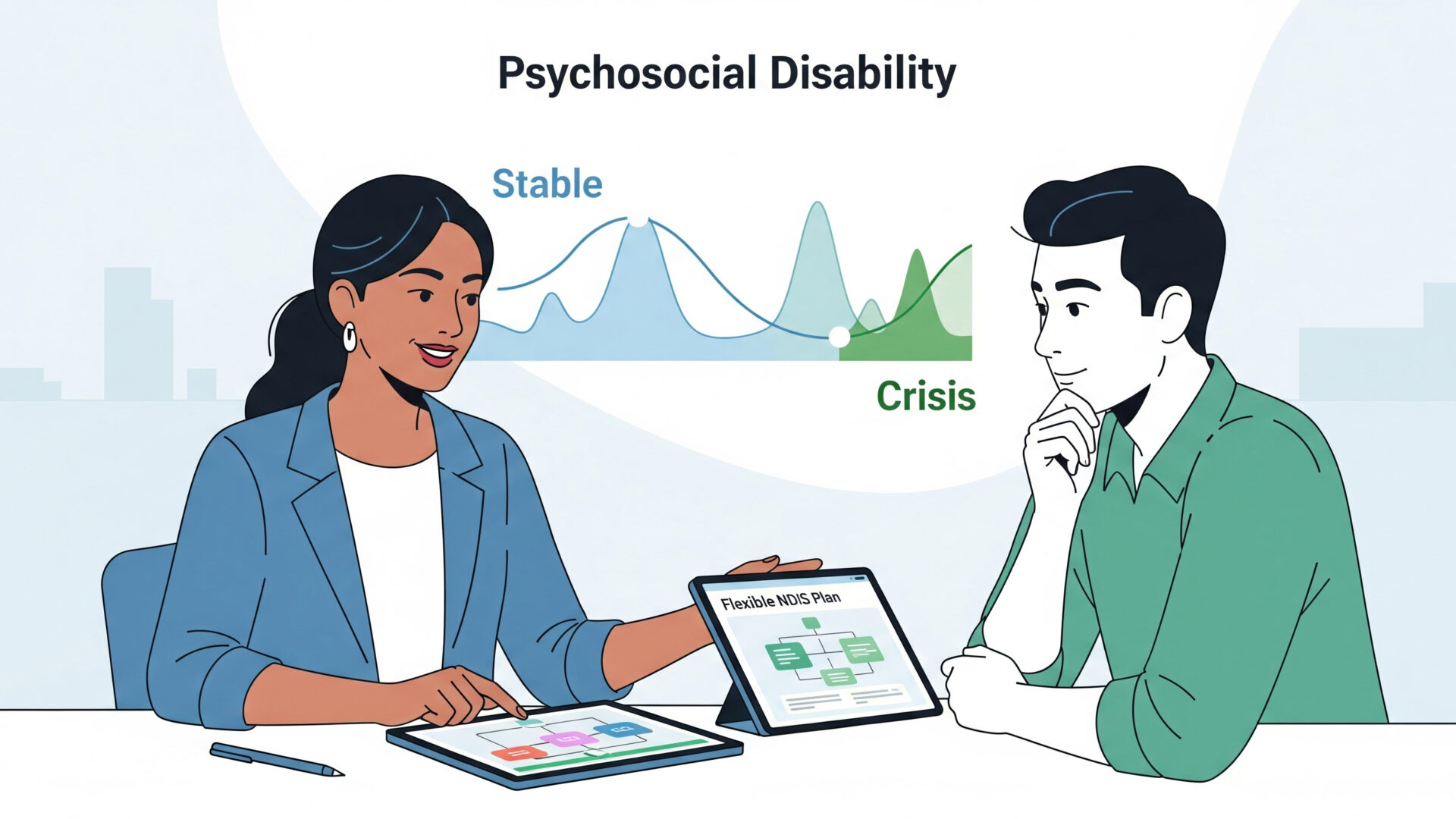Estimated reading time: 9 minutes
As a Support Coordinator, you’ve likely witnessed the ebb and flow of psychosocial disabilities firsthand. One week, your participant might engage enthusiastically in community activities, maintain their apartment impeccably, and attend all scheduled appointments. The next week, the same person might struggle to get out of bed, miss critical appointments, or experience overwhelming anxiety about leaving home.
This fluctuation isn’t a failure of support or a sign of inconsistent engagement—it’s the inherent episodic nature of psychosocial disability at work. At The SALT Foundation, we’ve developed expertise in creating flexible, responsive support systems that accommodate these natural variations in functioning and need.
This guide aims to equip Support Coordinators with practical strategies for developing NDIS plans that respond effectively to the episodic nature of psychosocial disability, ensuring participants receive appropriate support during both periods of wellness and periods of increased need.
Table of contents
Key Takeaways
- Psychosocial disabilities are characteristically episodic, with functioning levels that fluctuate rather than remain static.
- Recent NDIS legislative changes acknowledge that episodic conditions can qualify as “permanent” for eligibility purposes.
- Effective NDIS plans must incorporate both baseline supports and crisis/escalation pathways.
- Support Coordinators play a crucial role in educating NDIS planners about appropriate funding levels for episodic conditions.
- Proactive planning during periods of wellness creates safeguards for periods of increased need.
- Psychosocial Recovery Coaching offers a particularly valuable support option for participants with episodic conditions.
Understanding the Episodic Nature of Psychosocial Disability
When we describe psychosocial disabilities as “episodic,” we refer to their tendency to fluctuate in intensity and impact over time. Unlike many physical disabilities that remain relatively stable, psychosocial disabilities often follow patterns of remission and relapse or varying levels of functional impact.
The Australian Institute of Health and Welfare notes that mental illness can vary in severity and be episodic or persistent in nature. This pattern creates unique challenges for NDIS planning, which traditionally assumes relatively consistent support needs.
Consider depression as an example. A participant might experience several months of stable mood and energy, requiring minimal support to maintain their daily routines and community engagement. Then, perhaps triggered by seasonal changes, stress, or no identifiable cause at all, they might enter a period of acute depression, requiring significantly increased support to maintain basic self-care, medication management, and safety.
This doesn’t mean their underlying condition has changed—just that its manifestation and functional impact have temporarily intensified. The unpredictability of these shifts makes traditional support planning challenging but not impossible.
Impact on NDIS Planning and Implementation
The Permanency Question
One historical barrier for people with psychosocial disabilities accessing the NDIS was the scheme’s requirement for conditions to be “permanent.” Fortunately, recent legislative changes have clarified that episodic or fluctuating conditions can still be considered permanent for NDIS eligibility purposes.
The NDIS Act now specifically acknowledges that impairments may be episodic or fluctuating, but can still be considered permanent. The key consideration is not whether symptoms are constantly present, but whether the underlying condition is likely to be lifelong, even if its manifestations vary in intensity.
Funding Considerations
The episodic nature of psychosocial disability creates specific challenges for funding allocation. Traditional NDIS planning might calculate support hours based on a “typical” week, but for participants with episodic conditions, there’s no truly typical week.
Research from the University of Sydney’s Centre for Disability Research and Policy found that “People with psychosocial disability may require different levels of support at different times, making it difficult to predict and plan for support needs.” This unpredictability requires innovative approaches to NDIS planning.
As a Support Coordinator, you can advocate for:
- Core supports that flex up and down based on need, rather than rigid weekly allocations
- Funding reserves that can be activated during periods of increased need
- Crisis planning components within the plan
- Capacity building supports that help participants develop skills for self-management during periods of wellness
The Support Coordinator’s Toolkit: Practical Strategies
1. Baseline + Escalation Planning
Effective plans for participants with episodic conditions should include both baseline supports and clearly defined escalation pathways. During plan development, document:
- Baseline needs: The minimum supports required during periods of relative stability
- Early warning signs: Observable indicators that the participant may be entering a period of increased need
- Escalation protocols: Specific actions to take when early warning signs appear
- Crisis responses: Immediate interventions for acute episodes
This approach creates a responsive framework that can adapt to the participant’s changing needs without requiring constant plan reviews.
2. Building in Flexibility

The NDIS plan itself should contain built-in flexibility. This might include:
- Flexible support categories: Where possible, opt for less restrictive support categories that allow funds to be used across a range of needs
- Self-managed components: For participants with the capacity, self-managed funding provides maximum flexibility to respond to changing needs
- Documented provider agreements: Establish agreements with providers that allow for service intensity to increase or decrease based on need
Recent NDIS data shows that participants with psychosocial disability have higher rates of plan utilisation when flexibility is built into their plans, supporting the effectiveness of this approach.
3. Creating Wellness Plans
During periods of relative stability, work with participants to develop comprehensive wellness plans that:
- Document successful strategies and supports
- Identify early warning signs of deterioration
- Outline preferred interventions during difficult periods
- Specify communication preferences during crises
- Designate trusted decision-makers for periods of reduced capacity
These plans become invaluable resources during episodic fluctuations, guiding support responses in alignment with the participant’s expressed preferences.
4. Leveraging Specialised Supports
Certain NDIS supports are particularly valuable for managing the episodic nature of psychosocial disability:
Psychosocial Recovery Coaching
Psychosocial Recovery Coaches specialise in the unique needs of people with psychosocial disabilities. They can:
- Build skills for self-management during periods of wellness
- Identify early warning signs of deterioration
- Implement preventative strategies to reduce episode severity
- Provide intensive support during difficult periods
- Facilitate connections with clinical services when needed
At The SALT Foundation, our Recovery Coaches receive specialised training in working with episodic conditions, equipping them to provide truly responsive support.
Support Coordination
As a Support Coordinator, you play a crucial role in managing the episodic nature of psychosocial disability. This includes:
- Educating providers about the participant’s fluctuating needs
- Coordinating increased supports during difficult periods
- Advocating for plan flexibility and appropriate funding
- Ensuring continuity of care across episodes
- Documenting patterns to inform future planning
5. Data-Driven Advocacy
Documenting patterns over time creates powerful evidence for advocacy. Track:
- Frequency and duration of episodes
- Triggers or warning signs
- Effective interventions
- Support utilisation patterns
- Outcomes and recovery timelines
This data provides concrete evidence for NDIS planners during reviews, supporting requests for appropriate funding levels and flexible support arrangements.
Engaging Effectively During Different Phases
During Periods of Wellness
When a participant is experiencing relative stability:
- Focus on capacity building and skill development
- Strengthen natural support networks
- Develop and document successful strategies
- Create contingency plans for future episodes
- Practice self-management techniques
During Early Warning Phases
When signs of deterioration appear:
- Increase check-in frequency
- Activate preventative supports
- Review and implement wellness plan strategies
- Ensure medication adherence and clinical connections
- Communicate changes to the support network
During Acute Episodes
When a participant experiences an acute episode:
- Implement crisis response plans
- Coordinate increased supports
- Ensure safety and basic needs are met
- Maintain communication with clinical services
- Document interventions and outcomes
Conclusion
The episodic nature of psychosocial disability presents unique challenges for NDIS planning and implementation. However, with thoughtful strategy, appropriate advocacy, and responsive support coordination, these challenges can be effectively addressed.
By developing plans that accommodate fluctuations, building in appropriate flexibility, and leveraging specialised supports like Psychosocial Recovery Coaching, Support Coordinators can ensure participants receive the right support at the right time—regardless of where they are in their disability journey.
At The SALT Foundation, we’re committed to working alongside Support Coordinators to develop innovative approaches to the episodic nature of psychosocial disability. Our experience and expertise in this area allow us to provide valuable insights and support to both coordinators and participants navigating these complex waters.
Action Steps
- Review your participants’ plans for built-in flexibility and escalation pathways
- Develop wellness plans with participants during periods of stability
- Document patterns of episodic fluctuations to support future advocacy
- Educate providers about the need for responsive, flexible support arrangements
- Consider Psychosocial Recovery Coaching for participants with significant fluctuations
- Advocate for appropriate funding models that accommodate episodic needs
- Build crisis response protocols into all support arrangements
Frequently Asked Questions
Use concrete examples and data from the participant’s experience. Emphasise that while the condition itself is permanent, its manifestations and functional impacts naturally fluctuate.
Document patterns of fluctuation, including frequency, duration, and intensity of episodes. Track support utilisation during different phases to demonstrate varying needs. Collect statements from treating professionals that specifically address the episodic nature of the condition and the importance of responsive support. Where possible, document the consequences of insufficient support during difficult periods, such as hospitalisations or loss of housing.
Frame ongoing support during wellness as preventative rather than reactive. Explain how consistent engagement with certain supports can actually reduce the frequency and severity of difficult episodes. Also, focus on capacity-building activities during these periods that participants find meaningful and that contribute to their longer-term goals.
First, implement any crisis response protocols already in place. Contact the NDIA to request an urgent plan review based on changed circumstances. Also, document the situation thoroughly to support this request. Connect with community-based clinical services that can provide immediate support. Consider short-term use of mainstream services while advocating for appropriate NDIS support. If the situation is critical, contact the NDIS Quality and Safeguards Commission to report a potential service gap.
This requires thoughtful, collaborative planning during periods of wellness. Work with the participant to develop advance directives that specify their preferences for support during difficult periods. Document early warning signs that both the participant and their support network can recognise. Establish clear consent for certain interventions in specific circumstances. Finally, review and update these agreements regularly to ensure they remain aligned with the participant’s wishes and values.


